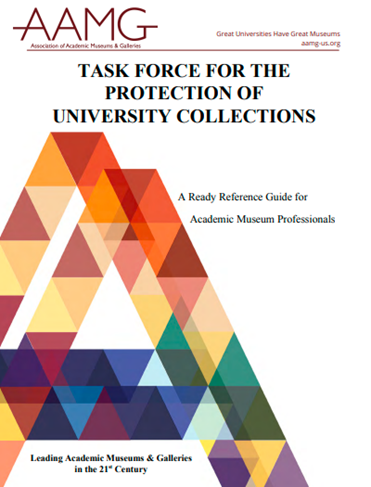CAA News Today
CAA’s Committee on Women in the Arts Annual Recognition Award, 2006
posted by CAA — August 18, 2022
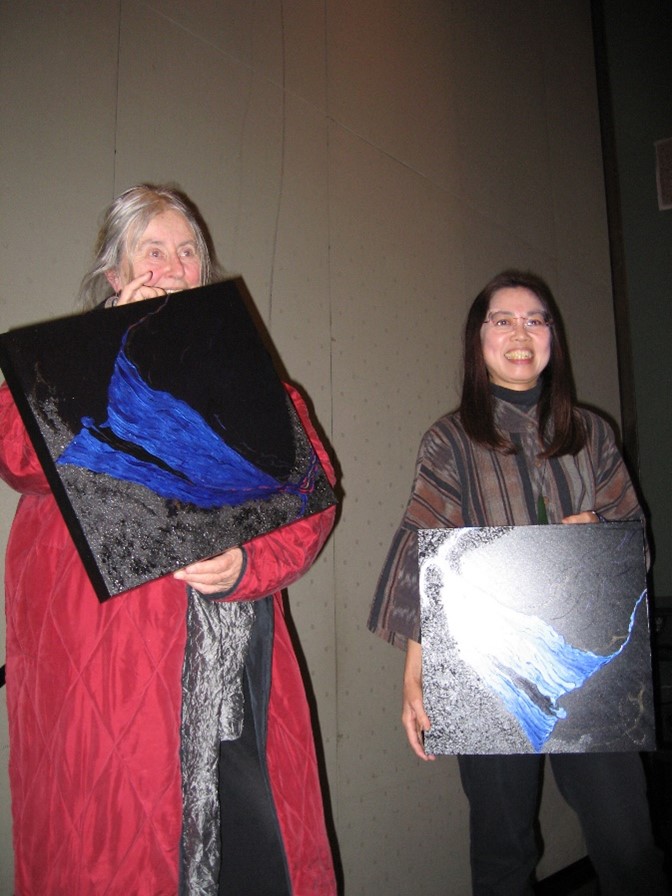
Photo of the 2006 CWA Award recipients, Moira Roth and Trinh T. Minh-ha holding paintings
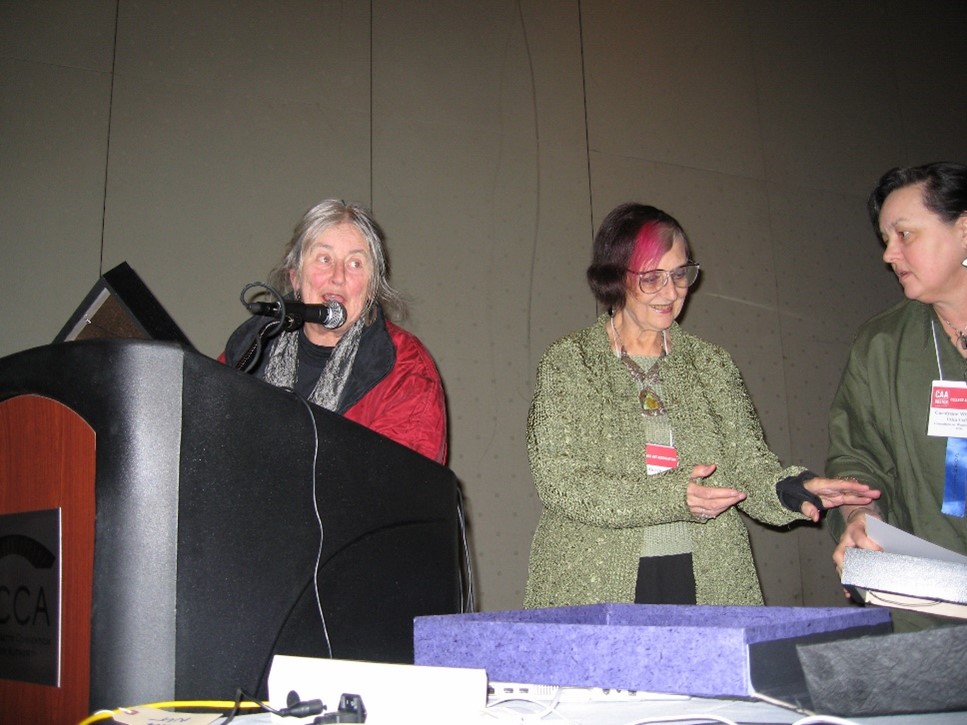
Moira (left) talking at the podium while Eleanor Dickinson (middle), then chair of CWA getting ready with the award gift created by Carolyne Manosevitz
In 2006, during the CAA Annual Conference in Boston, the Committee on Women in the Arts (CWA) honored Moira Roth (Trefethen Professor of Art History at Mills College in Oakland, CA) and Trinh T. Minh-ha (Professor of Women’s Studies and Rhetoric/Film at the University of California at Berkeley) with the CWA Annual Recognition Awards. Then CWA member, Carolyne Manosevitz, offered her own paintings as the award gifts. Roth, who recently passed away, was one of the first scholars to publish on feminist performance art. Her books, The Amazing Decade: Women in Performance Art in America (1983)and Rachel Rosenthal (1995), were groundbreaking. Minh-Ha is a Vietnam-born filmmaker, writer, and composer, whose practice is positioned within the fields of feminist and post-colonial studies.
After 2008, this award became a part of CAA’s Distinguished Awards program as the Distinguished Feminist Awards. The Distinguished Feminist Award is presented annually to a visual artist or designer who, through outstanding efforts in their practice or advocacy, has advanced the cause of equality for women in the arts; as well as a scholar who, through outstanding efforts in their scholarship, curatorial practice, or advocacy, has advanced the cause of equality for women in the arts. Read more about this award and its recipients here.
Post by Midori Yoshimoto
Midori Yoshimoto is associate professor of art history and gallery director at New Jersey City University. Yoshimoto specializes in post-1945 Japanese art and its diaspora with a focus on women artists, Fluxus, and intermedia. Her 2005 book, Into Performance: Japanese Women Artists in New York, led to numerous publications including an essay in Yoko Ono One Woman Show (Museum of Modern Art, New York, 2015). Yoshimoto co-curated a major survey exhibition of Japanese American artist Shigeko Kubota, which traveled three museums in Japan in 2021-22. Its catalog, Viva Video! The Art and Life of Shigeko Kubota was published by Kawade Shobo Shinsha and received the Ringa Art Encouragement Award in Japan. She is also a co-editor and author of a recent publication, Women, Aging, and Art: A Crosscultural Anthology (Bloomsbury, 2021).
In 1972, CAA founded its first committees devoted to women in the arts. As a part of this yearlong 50th anniversary celebration, we are sharing historic materials from CAA members and archives that intersect with feminism at the organization, including CAA’s Committee on Women in the Arts (CWA) and our Affiliated Societies, Women’s Caucus for Art (WCA) and The Feminist Art Project (TFAP).
This celebration culminates in a program and reception at Boston University’s Joan and Edgar Booth Theatre on Friday, September 23, 2022. This program will reflect upon the incredible history of feminist pioneers at the organization while looking toward a more inclusive, equitable future through the continued work of the CWA. The members of CWA are carrying the torch of feminism during this crucial time of precarity for women’s rights.
Over the next couple months, visit this site (CAA News) and our social media pages to explore more about this history and items from our archives.
Countering Feminist Indifference: Notes from the Women’s Caucus for Art
posted by CAA — August 15, 2022
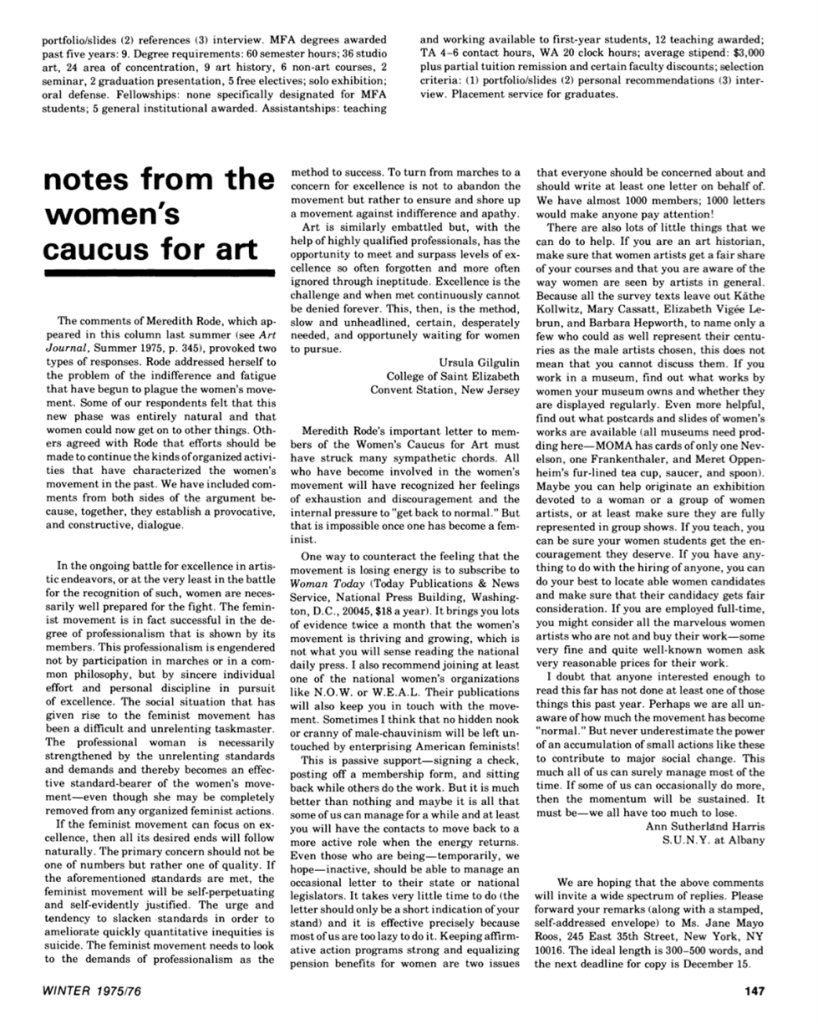
See full text reproduced below. Article also available on Jstor.
“Notes from the Women’s Caucus for Art (WCA),” a column featured in Art Journal during the 1970s, created an important forum for critical debates in the feminist art movement. In Summer 1975, for example, Meredith Rode shared evidence of fatigue with the feminist struggle in her letter “The High Price of Indifference.” Rode’s letter generated numerous responses in the winter 1975 issue, including Ann Sutherland Harris’s practical advice on how to counter this exhaustion.
The first President of WCA advocated both passive and activist gestures, ranging from sending a check to the National Organization of Women to pressuring local museums to display works by women in their collections, organizing group shows of women artists, mentoring female students, and buying women’s art.
This snapshot of WCA’s essential role in feminism art and activism reminds us how we can individually act to demand equity while working in conjunction with the collective efforts of essential national organizations, such as WCA and CAA. Read the full text below.
Post by Joanna Gardner-Huggett
Sources:
- Meredith Rode, “Notes from the Women’s Caucus for Art: The High Price of Indifference,” Art Journal (Summer 1975): 345.
- Ann Sutherland Harris, “Notes from the Women’s Caucus for Art,” Art Journal (Winter 1975/76): 147.
Biography of post author: Joanna Gardner-Huggett is an Associate Professor of History of Art and Architecture at DePaul University and Chair of the Committee on Women in the Arts. She teaches courses on twentieth-century art and feminist theory, while her research focuses on the intersection between feminist collaboration and arts activism and has been published in numerous journals and anthologies. Joanna’s most recent scholarship explores the history of the Chicago based women artists’ collectives Artemisia Gallery in Chicago (1973-2003), ARC Gallery (1973-present), and Sapphire and Crystals (1987-present).
FULL TEXT (from image): Ann Sutherland Harris, “Notes from the Women’s Caucus for Art,” Art Journal (Winter 1975/76): 147.
The comments of Meredith Rode, which appeared in this column last summer (see Art Journal, Summer 1975, p. 345), provoked two types of responses. Rode addressed herself to the problem of the indifference and fatigue that have begun to plague the women’s movement. Some of our respondents felt that this new phase was entirely natural and that women could now get on to other things. Other agreed with Rode that efforts should be made to continue the kinds of organized activities that have characterized the women’s movement in the past. We have included comments from both sides of the argument because, together, they establish a provocative, and constructive, dialogue.
In the going battle for excellence in artistic endeavors, or at the very least in the battle for the recognition of such, women are necessarily well prepared for the fight. The feminist movement is in fact successful in the degree of professionalism that is shown by its members. This professionalism is engendered not by participation in marches or in a common philosophy, but by sincere individual effort and personal discipline in pursuit of excellence. The social situation that has given rise to the feminist movement has been a difficult and unrelenting taskmaster. The professional woman is necessarily strengthened by the unrelenting standards and demands and thereby becomes an effective standard-bearer of the women’s movement—even though she may be completely remove from any organized feminist actions.
If the feminist movement can focus on excellence, then all its desire ends will follow naturally. The primary concern should not be one of the numbers but rather one of quality. If the aforementioned standards are met, the feminist movement will be self-perpetuating and self-evidently justified. The urge and tendency to slacken standards in order to ameliorate quickly quantitative inequities is suicide. The feminist movement needs to look to the demands of professionalism as the method to success. To turn from marches to a concern for excellence is not to abandon the movement but rather to ensure and shore up a movement against indifference and apathy.
Art is similarly embattled but, with the help of highly qualified professionals, has the opportunity to meet and surpass levels of excellence so often forgotten and more often ignored through ineptitude. Excellence is the challenge and when met continuously cannot be denied forever. This, then, is the method, slow and unheadlined, certain, desperately needed, and opportunely waiting for women to pursue.
Ursela Gilgulin, College of Saint Elizabeth, Convent Station, New Jersey
Meredith Rode’s important letter to members of the Women’s Caucus for Art must have struck many sympathetic chords. All who have become involved in the women’s movement will have recognized her feelings of exhaustion and discouragement and the internal pressure to “get back to normal.” But that is impossible once one has become a feminist.
One way to counteract the feeling that the movement is losing energy is to subscribe to Women Today. It brings you lots of evidence twice a month that the women’s movement is thriving and growing, which is not what you will sense reading the national daily press. I also recommend joining at least one of the national women’s organizations like N.O.W. or W.E.A.L. Their publications will also keep you in touch with the movement. Sometimes I think that no hidden nook or cranny of male-chauvinism will be left untouched by enterprising American feminists!
This is pass support—signing a check, posting off a membership form, and sitting back while others do the work. But it is much better than nothing and maybe it is all that some of us can manage for a while and at least you will have the contacts to move back to a more active role when the energy returns. Even those who are being—temporarily, we hope—in active, should be able to manage an occasional letter to their state or national legislators. It takes very little time to do (the letter should only be a short indication of your stand) and it is effective precisely because most of us are too lazy to do it. Keeping affirmative action programs strong and equalizing pension benefits for women are two issues that everyone should be concerned about and should write at least one letter on behalf of. We have almost 1000 members; 1000 letters would make anyone pay attention!
There are also lots of little things that we can do to help. If you are an art historian, make sure that women artists get a fair share of your courses and that you are aware of the way women are seen by artists in general. Because all the survey texts leave out Käthe Kollwitz, Mary Cassatt, Élisabeth Louise Vigée Le Brun, and Barbara Hepworth, to name only a few who could as well represent their centuries as the male artists chosen, this does not mean that you cannot discuss them. If you work in a museum, find out what works by women your museum owns and whether they are displayed regularly. Even more helpful, find out what postcards and slides of women’s works are available (all museums need prodding here—MOMA has cards of only one Nevelson, one Frankenthaler, and Meret Oppenheim’s fur-lined tea cup, saucer, and spoon). Maybe you can help originate an exhibition devoted to a woman or a group of women artists, or at least make sure they are fully represented in group shows. If you teach, you can be sure your women students get the encouragement they deserve. If you have anything to do with the hiring of anyone, you can do your best to locate able women candidates and makes sure that their candidacy gets fair consideration. If you are employed full-time, you might consider all the marvelous women artists who are not and buy their work—some very fine and quite well-known women ask very reasonable prices for their work.
I doubt that anyone interested enough to read this far has not done at least one of these things this past year. Perhaps we are all unaware of how much the movement has become “normal.” But never underestimate the power of an accumulation of small actions like these to contribute to major social change. This much all of us can surely manage most of the time. If some of us can occasionally do more, then the momentum will be sustained. It must be—we all have too much to lose.
Ann Sutherland Harris, S.U.N.Y at Albany
In 1972, CAA founded its first committees devoted to women in the arts. As a part of this yearlong 50th anniversary celebration, we are sharing historic materials from CAA members and archives that intersect with feminism at the organization, including CAA’s Committee on Women in the Arts (CWA) and our Affiliated Societies, Women’s Caucus for Art (WCA) and The Feminist Art Project (TFAP).
This celebration culminates in a program and reception at Boston University’s Joan and Edgar Booth Theatre on Friday, September 23, 2022. This program will reflect upon the incredible history of feminist pioneers at the organization while looking toward a more inclusive, equitable future through the continued work of the CWA. The members of CWA are carrying the torch of feminism during this crucial time of precarity for women’s rights.
Over the next couple months, visit this site (CAA News) and our social media pages to explore more about this history and items from our archives.
CAA Signs On to Statement Expressing Dismay Over Dobbs vs. Jackson
posted by CAA — July 07, 2022
The College Art Association has signed on to this statement from the American Historical Association (AHA) and the Organization of American Historians (OAH). The statement expresses dismay over the Supreme Court majority opinion in the Dobbs v. Jackson Women’s Health decision that overturned Roe v. Wade. It argues that the decision misrepresents history, instead “adopt[ing] a flawed interpretation of abortion criminalization that has been pressed by anti-abortion advocates for more than thirty years.” It warns that the Court’s majority opinion does not meet the standards of historical scholarship and that “[t]hese misrepresentations are now enshrined in a text that becomes authoritative for legal reference and citation in the future.”
UPDATE: CAA signs on to letter to EPA protesting closure of online archive
posted by CAA — June 14, 2022
Last month, The College Art Association signed on to a letter from the American Society for Environmental History (ASEH) directed to the EPA in protest of the agency’s decision to retire its online archive. The letter was sent on Monday, June 13, 2022, in coordination with the delivery of a letter from Environmental Data & Governance Initiative (EDGI) with co-signers, including the Sierra Club several libraries, and other organizations.
The announcement is available on ASEH’s website.
EDGI’s letter can be found here, and their press release can be found here.
CAA signs on to letter to EPA protesting closure of online archive
posted by CAA — May 05, 2022
The College Art Association has signed onto a letter from the American Society for Environmental History directed to the EPA in protest of the agency’s decision to retire its online archive. The text of the full letter is provided below.
—
The Honorable Michael Regan
Administrator
Environmental Protection Agency
1200 Pennsylvania Ave. NW
Washington, DC 20460
michael.regan@epa.gov
Re:
Dear Administrator Regan,
We the undersigned write to express our opposition to EPA’s plan announced in February to sunset its online archive in July 2022. The vast majority of our government’s interaction with the public comes through digital channels; public digital archives such as the EPA’s are of enormous value to historians as well as to the public.
This EPA archive has already proven immensely useful to environmental historians. Not only are citations to it regularly featured in traditional scholarly venues, it has greatly facilitated projects such as “A People’s EPA”, a website and Twitter feed through which historians help explain the work of the EPA to a broader public.
Not just historians but those from a variety of academic disciplines as well as the public rely on the EPA digital archive for information, insight, and analysis. The site has provided resources for others working in ecology, biology, toxicology, and other environmental sciences as well as geography, law, sociology, political science, and public health. Professors and teachers at various levels, from K-12 schools to the graduate level utilize the archive as a pedagogical resource, directing students to pages that offer authoritative records of the geographies they are exploring. Not least among those who have relied on the EPA’s online archive are those working with and living in more marginalized or environmental justice communities, a stated priority of current EPA leadership.
Having easily accessible documentation of the extensive EPA’s investigations and records of decision for Camp Lejeune, North Carolina, for instance, has helped overcome local doubts about the agency’s effectiveness, yielded greater understanding of chemical exposures, and otherwise significantly supported the agency’s efforts at clean-up. Here and elsewhere, residents faced with a potential environmental hazard can more easily access the agency’s past work in their locale as an aid to understanding prior investigations at the site.
The importance of EPA’s online archive is perhaps best illuminated by considering what will be lost when this archive is taken down. The many mentioned uses of EPA documents will become much more difficult for those who cannot travel to EPA’s print collections, and with any pandemic recurrence, well-nigh impossible. A tremendous gap will also open up in what more recent historical records are accessible, as it takes many years for any preserved documents to be transferred to and made available through the National Archives. It will become much more difficult for historians to assess and interpret this agency’s recent past, much less to situate it within longer histories and larger contexts.
We understand that the EPA’s provision of a public archive of its own documents and deliberations is voluntary and that online maintenance entails some costs. But those need to be factored against the better and broader understanding it has nourished of the vital work done by this federal agency, whose own future hinges on greater public awareness of and support for what it does. Instead of doing away with the EPA archive, the Biden administration should promote it as a model for other parts of the Executive Branch. In our digital age, agencies should make their own publications and other public interactions more quickly, thoroughly, and durably accessible, both to historians and to the larger publics our government serves.
Looking Back at a Year of Robust Humanities Advocacy
posted by CAA — April 25, 2022
By Alexandra Klein, National Humanities Alliance (NHA) Communications and Government Relations Manager
In early March, five months after Fiscal Year 2022 began, Congress finally passed a funding package for the year. The package included significant increases for federal humanities programs—most significantly, the largest increase we’ve seen in a decade for the National Endowment for the Humanities.
This success followed a full year of robust humanities advocacy, much of which was supported by scholarly societies such as CAA. For example, thanks to their ability to mobilize their members, we were able to recruit advocates from all 50 states to participate in our 2021 Humanities Advocacy Day, which kicked off our advocacy for these FY 22 wins.
In addition to many other engagements with members of Congress and their staff throughout the year, we followed Humanities Advocacy Day with two congressional briefings to highlight the impact of NEH funding.
The first briefing, held in September 2021, discussed NEH funding for diverse histories and civics in K–12 education. Since 2018, NHA has worked with over 20 NEH-funded professional development programs for K-12 educators to survey their impacts, and this briefing was an opportunity for congressional staff to hear about the data we’ve collected. At the briefing, we shared that 100 percent of respondents to a post-program survey reported experiencing professional growth as a result of the program they attended and 98 percent of respondents said they would recommend participating in an NEH workshop to a colleague. Staffers also heard directly from project directors about how these programs—which covered a range of topics including Native American histories, the Mississippi Delta, the Transcontinental Railroad, and Japanese American internment—offer crucial professional development to our nation’s educators, illuminate diverse histories, and support civic education in our nation’s classrooms.
The second briefing, held in November 2021, showcased how NEH funding for public humanities discussions enriches our communities by highlighting the example of the NEH-funded “Freedom Stories: Unearthing the Black Heritage of Appalachia the International Storytelling Center (ISC) in Jonesborough, Tennessee. Those involved in the project spoke about how it built space for dialogue and learning, and about how the discussions offered participants the chance to explore our rich histories and come together across differences. Thanks to a partnership with NHA to document the impact of the program, we were able to highlight that 82 percent of participants in the “Freedom Stories” program agreed that they “feel more confident taking part in thoughtful discussions about race” as a result of the program, and 93 percent felt motivated to “listen to the stories of people whose backgrounds are different from [their] own.”
After a long year of advocacy and several continuing resolutions that kept government funding at FY 21 levels past the beginning of FY 22, we were particularly pleased to see Congress approve a $12.5 million funding increase for the NEH in March, bringing its FY 22 budget to $180 million.
Our other priorities also saw increases. These included an increase of $2.5 million for Title VI, which brought its funding to $71.9 million, and an increase of $1 million for Fulbright-Hays, which brought its funding to $9.8 million. The Institute of Museum and Library Services received $268 million, an $11 million increase for the agency overall. While there was an increase for both the Office of Museum Services and the administration budget, the funding to carry out the Library Services and Technology Act remained level. The National Archives and Records Administration received $388 million, an $11 million increase. And NHPRC received $7 million, a half a million dollar increase.
There was one disappointment that came with these numbers. Nearly across the board, these final numbers were significantly lower than the numbers that the House and Senate originally proposed for our priorities. This was, however, the case for nearly all domestic spending.
As we turn our attention to FY 2023, we are hopeful we can build on the level of support we saw in the initial FY 2022 bills to secure additional increases in the coming year. The FY 23 process is off to a good start with the administration proposing another round of robust increases for several humanities priorities, which we will be working to make a reality as Congress drafts its yearly appropriations bills.
From Kyivan Rus’ to Modern Ukraine: Virtual Conversations on History, Art, and Cultural Heritage
posted by CAA — April 11, 2022
Ukraine’s history, art, and culture are endangered by the ongoing war. At Dumbarton Oaks, this lecture and conversation series by experts in the fields of history, art history, archaeology, heritage, sociology, as well as museums and conservation, among others, presents the region’s rich historical and cultural complexity through its objects, sites, and monuments. A focus on the medieval and early modern periods featuring Greek, Latin, and Slavic contacts, brings to the fore critical evidence to counter modern misrepresentations of Ukraine’s history and cultural heritage.
INAUGURAL LECTURE | FRIDAY 22 APRIL 2022 | 12:00 EDT [ 17:00 London | 18:00 Paris | 19:00 Kyiv ]
OLENKA Z. PEVNY (University of Cambridge)
“Lacunae of Art History and Kyiv’s Visual Culture”
Free and open to the public. Register for the inaugural lecture here. If you cannot attend but would like to receive future updates about this series of events, please join the mailing list here.

Future events include:
- May 2022 – Lecture: Mariana Levytska, National Academy of Sciences of Ukraine (The “Holy Rus’ concept” and Religious Art with Political Connotations (Pochaiv Monastery in 19th century)
- May 2022 – Discussion workshop on The Cathedral of St. Sophia, Kyiv
- June 2022 – Lecture: Christian Raffensperger, Wittenberg University (“Medieval Origins and Modern Constructs, Rus – Ukraine – Russia”)
- July 2022 – Lecture: Liudmyla Sharipova, University of Nottingham (Mazepa’s women before and after Poltava: to save and to keep)
- July 2022 – Discussion workshop on Endangered Monuments
- September 2022 – Lecture: Maria Grazia Bartolini, Università degli Studi di Milano (Reading the image of prince Volodymyr Sviatoslavych in seventeenth-century Kyiv)
- September 2022 – Discussion workshop on Displaced Cultural Heritage.
- October 2022 – Lecture: Nazar Kozak, Senior Research Scholar, Department of Art History, The Ethnology Institute, National Academy of Sciences of Ukraine Lviv (Images of Power and Their Discursive Site-Specificity in Kyivan Rus’)
- November 2022 – Lecture: Talia Zajac, University of Toronto (will speak about the marriages between the ruling clan of Rus’ and Latin Christian Europe or the translation and commentary on the eleventh-century prayerbook of Gertruda of Poland)
- November 2022 – Discussion workshop on historical memory.
- December 2022 – Lecture: Halyna Kohut, Associate Professor, Ivan Franko National University of Lviv (Taste, Social Class, and Oriental Carpet Design in the Eighteenth-Century Cossack Hetmanate)
SPONSORSHIP AND ENDORSEMENT:
- Dumbarton Oaks
- Princeton University
- Boise State University
- Tufts University
- Centre for Medieval and Early Modern Studies, University of Kent
- College Art Association (CAA)
- Byzantine Studies Association of North America (BSANA)
- British Association for Slavonic and East European Studies (BASEES)
- Historians of German, Scandinavian, and Central European Art (HGSCEA)
- Society of Historians of Eastern European, Eurasian and Russian Art and Architecture (SHERA)
Association of Academic Museums & Galleries Reference Guide
posted by CAA — April 05, 2022
The Association of Academic Museums and Galleries has published The Task Force for the Protection of University Collections: A Ready Reference Guide for Academic Museum Professionals. The Task Force, which includes CAA and its Executive Director and CEO, Meme Omogbai, aims to serve as a resource and advocate for college and university museums whose collections are or may be under threat. This guide outlines the Task Force’s purpose and has basic information for museum professionals to begin to address challenges related to voluntary deaccessions.
Women’s History Month and Art Journal Open
posted by CAA — March 21, 2022
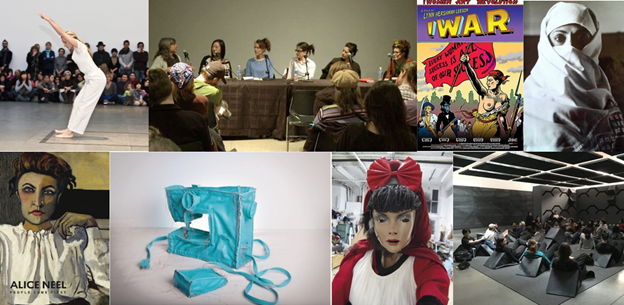
Each week this Women’s History Month, we highlight the rich scholarship and programs produced at CAA that celebrate women in the fields of visual arts and the humanities. This week, we are sharing a bibliography of articles from our open-access journal Art Journal Open that feature women artists.
This Women’s History Month is also especially significant this year, which is the 50th anniversary of feminism at CAA. To learn more about this history, visit this page. CAA is also collecting archival materials to better understand and document the history of its Committee of Women in the Arts, including the committee’s many collaborations with other affiliate committees and groups, such as the Women’s Caucus for Art, The Feminist Art Project, the Queer Caucus, and many more. Visit this page for more information.
 |
Andrew, Nell. “DadaDance: Sophie Taueber’s Visceral Abstraction.” Art Journal Open (July 3, 2014).
Sophie Taueber-Arp, Free Vertical-Horizontal Rhythms (Rythmes verticaux-horizontaux libres), 1919, gouache, 11 15⁄16 x 8 9⁄16 in. (30.3 x 21.8 cm). Stiftung Hans Arp und Sophie Taeuber Arp e.V., inv. 003.205 (artwork in the public domain; photograph provided by Stiftung Hans Arp und Sophie Taeuber Arp) |
 |
Barakeh, Zeina. “Projections for the Third Half [Cloud Storm].” Art Journal Open (August 6, 2020).
Zeina Barakeh, Projections From The Third Half [Cloud Storm], 2020, animation, 3 min. (artwork © Zeina Barakeh) |
 |
Barber, Tiffany E. “Narcissister, a Truly Kinky Artist.” Art Journal Open (March 11, 2020).
Narcissister, Red Riding Hood, 2014, mixed media (photograph provided by the artist) |
 |
Berrigan, Caitlin and Sasha Engelmann. “Fault Lines and Fractures: A Conversation about Imaginary Explosions.” Art Journal Open (December 17, 2020).
Caitlin Berrigan, excerpt from Imaginary Explosions, 2018 |
 |
Bryan-Wilson, Julia and Mary Beth Heffernan. “Facing Social Practice: Mary Beth Heffernan in conversation with Julia Bryan-Wilson.” Art Journal Open (June 30, 2020).
Stanford Express Care nurse Anna Chico, who was among the first providers to use PPE Portraits for COVID-19 care, March 2020 (photograph by Cati Brown-Johnson) |
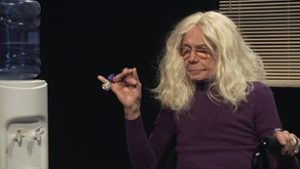 |
Burns, A.K. and Melissa Ragain. “Scripting A Smeary Spot.” Art Journal Open (December 8, 2017).
The late Jack Doroshow performs as Mother Flawless, a clairvoyant psyche. In this scene she recites an excerpt from Joanna Russ’ sci-fi novel We Who Are About To. . . , A.K. Burns, video still from A Smeary Spot, 2015, four-channel video installation, HD color, six-channel sound, TRT 53:13 (artwork © A.K. Burns; image provided by the artist, Callicoon Fine Arts, NY, and Michel Rein Gallery, Paris/Brussels) |
 |
Cancelmo, Amy. “Roots and Ramble Kija Lucas and Amy Cancelmo in Conversation.” Art Journal Open (August 30, 2016).
Kija Lucas, Bristol 30, 2013, archival pigment print, 20 x 24 in. (50.8 x 60.9 cm), from In Search of Home, (artwork © Kija Lucas) |
 |
Carland, Tammy Rae and Ann Cvetkovich. “Sharing an Archive of Feelings: A Conversation.” Art Journal Open (October 24, 2013).
Tammy Rae Carland, Galz Living Room, MWMF, from Outpost, 2004, color photograph, 20 x 24 in. (50.8 x 61cm) (artwork © Tammy Rae Carland) |
 |
Costello, Kate. “P&P .” Art Journal Open (November 3, 2016).
Still from Kate Costello, P&P, 2016, video, 1 min., 26 sec. (artwork © Kate Costello) |
 |
Craycroft, Anna. “To Listen.” Art Journal Open (October 25, 2017).
Sophomore Seminar with Meg Cranston and Marlena Donohue, April 5, 2017: Meg Cranston and Marlena Donohue’s class met with Anna Craycroft to discuss Tuning the Room in relation to Umberto Eco’s essay “The Open Work.” (artwork © Anna Craycroft) |
 |
Craycroft, Anna. “To Record, to Interpret, to Comment.” Art Journal Open (March 1, 2017).
Anna Craycroft, The Earth Is a Magnet, 2016, installation view, part of The Artist’s Museum, Institute of Contemporary Art Boston, November 16, 2016–March 26, 2017 (artwork © Anna Craycroft; photograph by Charles Mayer) |
 |
DaPonte, Amy A. “Candida Höfer’s Turken in Deutschland as ‘Counter-publicity’.” Art Journal Open (January 6, 2017).
Candida Höfer, Untitled from Türken in Deutschland 1979, 1979, color slide projection, 80 slides, approx. 7 min., dimensions variable (artwork © Candida Höfer, Köln/VG Bild-Kunst, Bonn 2016) |
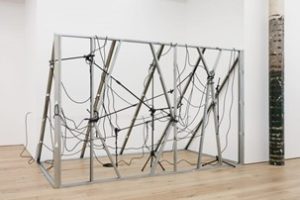 |
Fuenmayor, Jesús. “Barricades of Silence: Nikita Gale in Conversation with Jesús Fuenmayor.” Art Journal Open (August 20, 2020).
Nikita Gale, INTERCEPTOR, 2019, installation view, Fall Apart: Nikita Gale & Pat O’Neill, Martos Gallery, New York, January 11–February 24, 2019 (artwork © Nikita Gale; photograph by Charles Benton/Martos Gallery, provided by the artist) |
 |
Goodeve, Thyrza Nichols. “The Cat is My Medium: Notes on Writing and Art of Carloee Schneemann.” Art Journal Open (July 29, 2015).
Carolee Schneemann, Kitch’s Last Meal, 1973–76, Super 8mm film, double projection, vertical, sound on cassette, ca. 5 hrs., two installation views (artwork © Carolee Schneemann; photographs provided by the artist) |
 |
Goulish, Matthew. “A Clear Day and No Memories: Neurology, Philosophy, and Analogy in Kerry Tribe’s HM.” Art Journal Open (February 5, 2014).
Eadward Muybridge, Pi-Wi-Ack, Valley of the Yosemite (Shower of Stars), “Vernal Fall,” 400 Feet Fall, No. 29, 1872, wet-plate collodion photograph (photograph in the public domain) |
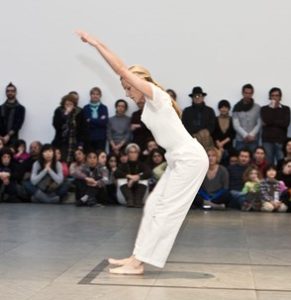 |
Graham, Amanda Jane. “Space Travels: Trisha Brown’s Locus.” Art Journal Open (July 22, 2016).
Trisha Brown, Locus Solo, 2011, performed by Diane Madden in “Performance 11: OnLine/Trisha Brown Dance Company” in conjunction with the exhibition On Line: Drawing through the Twentieth Century, Museum of Modern Art, New York, January 2011 (photographs © Yi-Chun Wu; photographs provided by Museum of Modern Art/Licensed by SCALA/Art Resource, NY) |
 |
Jenkinson, Monique. “Diva Maw.” Art Journal Open (October 29, 2020).
Monique Jenkinson (Fauxnique), Diva Maw, 2020, digital video, 5:35 min.; soundtrack by Marc Kate, Untitled (“Diva Maw” Soundtrack), 2020, audio file (video © Monique Jenkinson; soundtrack © Marc Kate) |
 |
Kauffman, Vanessa. “Outside of Time: Patricia Fernández Carcedo in Conversation with Vanessa Kauffman.” Art Journal Open (August 12, 2016).
Visitors in Patricia Fernández Carcedo’s studio during Headlands’ Fall 2015 Open House (artwork © Patricia Fernández Carcedo; photograph by Rebecca Puretz, provided by Headlands Center for the Arts) |
 |
Laser, Liz Magic and Christopher Y. Lew. “InterAct: a reenacted interview.” Art Journal Open (May 4, 2011)
Liz Magic Laser, Flight, 2010, performance, MoMA PS1, Long Island City, April 10, 2010 (artwork © Liz Magic Laser; photograph by Mia Tramz, provided by Derek Eller Gallery). The performance was developed in collaboration with actors Lindsey Andersen, Nic Grelli, Elizabeth Hodur, Michael Wiener, Max Woertendyke, and Lia Woertendyke |
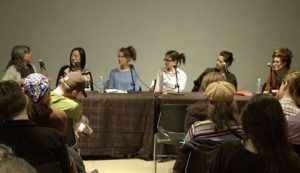 |
Lee, Young Jean. “Women in Downtown Theater.” Art Journal Open (August 26, 2012). |
 |
Leeson, Lynn Hershman. “Excerpts from the Graphic Novel !Women Art Revolution—A Secret History.” Art Journal Open (May 29, 2011) |
 |
Mann, Elana. “One day I will make a mace, but for now I have a mouth.” Art Journal Open (September 30, 2021).
Elana Mann, Unidentified Bright Object #61, 2021, clay, wood, and glass, 14 ½ x 3 ½ x 3 ¾ in. (36.8 x 8.9 x 9.5 cm) (artwork © Elana Mann; photographs by Brica Wilcox) |
 |
Masley-Charlet, Caitlin. “Caitlin Masley-Charlet in Conversation with Elisabeth Smolarz.” Art Journal Open (June 5, 2018).
Elisabeth Smolarz, ENCYCLOPEDIA OF THINGS, ongoing 2014–2017. Archival inkjet prints, dimensions variable. Courtesy of the artist. |
 |
Masley-Charlet, Caitlin. “Caitlin Masley-Charlet and Diana Shpungin in Conversation.” Art Journal Open (July 8, 2016).
Diana Shpungin, detail of A Break in One and Several Places, 2015, graphite pencil, horsehair broom, glazed porcelain and stoneware, 24 x 43 x 14 in. (60.9 x 109.2 x 35.5 cm) (artwork © Diana Shpungin) |
 |
McKee, C.C. “‘a salting of sorts’: Salt, Sea, and Affective Form in the work of Deborah Jack.” Art Journal Open (July 30, 2019).
Deborah Jack, SHORE, 2004, nylon screens, video projection, rock salt, reflecting pool, dimensions variable, installation view, Big Orbit Gallery, Buffalo, New York (artwork © Deborah Jack; photograph provided by the artist) |
 |
McClure, Michael Jay. “If it Need Be Termed Surrender: Trisha Donnelly’s Subjunctive Case.” Art Journal Open (July 29, 2013).
Trisha Donnelly, Untitled, 2008, plaster, horsehair, paint, pillow, belts, lamp, two parts, ea. 36 x 60 x 22¾ in. (91.4 x 152.4 x 57.8 cm), installation view, The Quick and the Dead, Walker Art Center, 2009 (artwork © Trisha Donnelly; photograph provided by Casey Kaplan, New York) |
 |
Ohsawa, Asuka. “Squares, Triangles, and Cats.” Art Journal Open (December 31, 2020). |
 |
Porges, Maria. “Shortest Stories.” Art Journal Open (December 20, 2018). |
 |
Rosa, María Laura. “Questions of Identity: Photographic Series by Alicia D’Amico, 1983–86.” Art Journal Open (July 2, 2019).
Alicia D’Amico photograph of Liliana, a performance by Liliana Mizrahi, 1983, scanned copy of original negative, reproduction from original 35mm negative contact (photograph © Archivo Alicia D’Amico, Buenos Aires) |
 |
Santos, Dorothy R. “ Domain Errors.” Art Journal Open (July 24, 2020). |
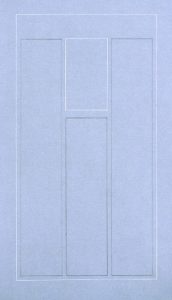 |
Schiff, Karen L. “Imprinting Agnes Martin.” Art Journal Open (December 19, 2014).
Karen L. Schiff, Agnes Martin, El País, 21 December 2004, II, 2005, graphite and stylus on vellum, 17 x 12 inches (artwork © Karen L. Schiff) |
 |
Sifuentes, Aram Han. “Official Unofficial Voting Station: Voting for All Who Legally Can’t.” Art Journal Open (October 1, 2020).
Protest Banner Lending Library, Let Us Vote! and Official Unofficial Voting Station, 2020, textile banners (photograph by Thaib A. Wahab) |
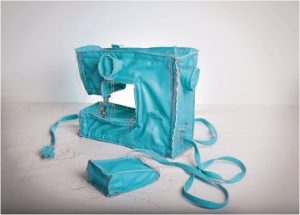 |
Szymanek, Angelique. “Haptic Encounters: Margarita Cabera’s Space in Between.” Art Journal Open (October 15, 2020).
Margarita Cabrera, Sewing Machine (Blue-Green), 2016, vinyl, thread, copper wire, and appliance parts (artwork © 2020 Margarita Cabrera/Licensed by VAGA at Artists Rights Society [ARS], NY; photograph provided by the artist) |
 |
Vlassopoulou, Penelope. “No water, Athens, Greece, 2015: Twenty-four hours with nothing to eat or drink, only smelling the jasmine.” Art Journal Open (October 26, 2016).
Excerpt from Pandelis Prevelakis, I Kefali tis Medousas [The Head of Medusa] (Athens: Friends’ Editions, 1963), trans. the artist and Markus Nystrom |
 |
Watt, Marie. “In Conversation with Marie Watt: A New Coyote Tale.” Art Journal Open (October 19, 2017).
Marie Watt, Blanket Stories: Transportation Object, Generous Ones, Trek, 2014, cast bronze, 18 x 4 x 6 ft. (5.49 x 1.22 x 1.83 m). Permanent installation, Tacoma Art Museum, Tacoma, Washington (artwork © Marie Watt; photograph by Benjamin Benschneider/OTTO) |
 |
Wilson, Siona. “Portraits (and) Matter.” Art Journal Open (January 13, 2022). |
 |
Yoshitake, Mika. “Humans have been Human for so long: Shana Lutker and Mika Yoshitake in Conversation.” Art Journal Open (August 2, 2016).
Shana Lutker, A handsome confused puppet, 2015, mirrored glass box, fluorescent lights, wood, marble, casters, 49 x 30 x 19 in. (124.4 x 76.2 x 48.2 cm) (artwork © Shana Lutker; photograph by Cathy Carver) |
 |
Yurshansky, Jenny. “Hide and Seek.” Art Journal Open (March 25, 2021).
Jenny Yurshansky, Hide and Seek (folded view), 2021, interactive sculpture, inkjet print, 3 3/4 x 3 3/4 x 3 in. (9.5 x 9.5 x 7.6 cm) (photograph provided by the artist) Folk tradition meets revisionist storytelling in Jenny Yurshansky’s printable sculpture |
Humanities Advocacy Day
posted by CAA — March 18, 2022
March 14 – 15, 2022 Hosted by National Alliance for the Humanities
CAA attended Humanities Advocacy Day this March. The event provides the opportunity to connect with a growing number of humanities advocates from around the country. On March 14, we explored approaches to year-round advocacy on college campuses and in local communities. Shelly C. Lowe, Chair of the National Endowment for the Humanities, discussed her goals and vision for the NEH with Jim Grossman, president of the National Humanities Alliance and executive director of the American Historical Association.
On Humanities Advocacy Day, March 15, meetings were held with House and Senate offices to make a persuasive case for federal funding for the humanities. CAA staff met with representatives from Senator Schumer’s office as well as Representative Nadler’s office. The programs were all held virtually. Learn more.



